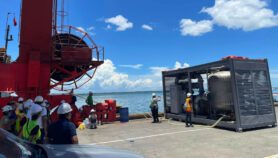By: Pratchaya W.
Send to a friend
The details you provide on this page will not be used to send unsolicited email, and will not be sold to a 3rd party. See privacy policy.
[BANGKOK] Thailand is expanding its nanotechnology strategy into the energy and agriculture sectors after reporting success in the first phase of its national nanotechnology policy.
Developments such as nano-based solar cells and batteries, and nano-plastic packaging to enhance food quality, could be in the pipeline according to Sirirurg Songsivilai, executive director of the state-run National Nanotechnology Center (Nanotec).
Speaking on the sidelines of the third Thailand Nanotechnology Conference last month (21–22 December), Songsivilai claimed a national strategic plan for nanotechnology, launched in 2007, had been a success initially in the textile, chemical and medical sectors. Among new products are fabrics and Thai herbal medicines that are both ‘nano-coated’, he said.
Under the plan, 300 million Thai baht (about US$9 million) will be spent on nanotechnology by the government each year.
The move into energy and agriculture, which started late last year, is in line with world trends, added Songsivilai.
"Energy and the environment have gained more and more attention, and this is well-matched to what we are pushing forward. The farming sector is also our main economic base and should be developed further."
The strategic plan calls for nano-products to account for as much as one per cent of the country’s GDP by 2013 — equivalent to US$3 billion. It also aims to raise health and environmental standards to international levels with the use of nanotechnology, and to lead the Association of Southeast Asian Nations in nano-based education and research and development.
Songsivilai said Nanotec had set up seven associate centres in universities nationwide, with about 400 researchers in total. To attract new researchers — the strategic plan aims for 100 a year up until 2013 — the centre has so far awarded about 100 scholarships to students to study up to PhD level overseas, and 200 more in the country.
He said the main challenge for capacity building is how to recruit researchers who have critical and holistic thinking.
Joydeep Dutta, director of the Center of Excellence in Nanotechnology at Thailand’s Asian Institute of Technology, said the country’s nanotechnology development was far behind other countries — ten years, at least.
But he believes that Thailand can catch up with others, particularly by creating a concrete policy to put nanotechnology on school curriculums. He said the sector is on the right track by targeting agriculture and energy.
"It’s just the beginning," he said. "We need extensive capacity building and, more importantly, we need critical thinking in the field."













